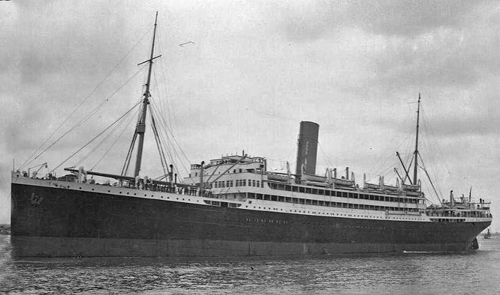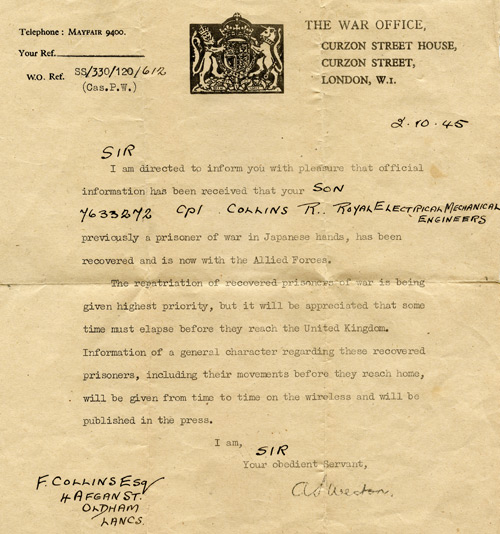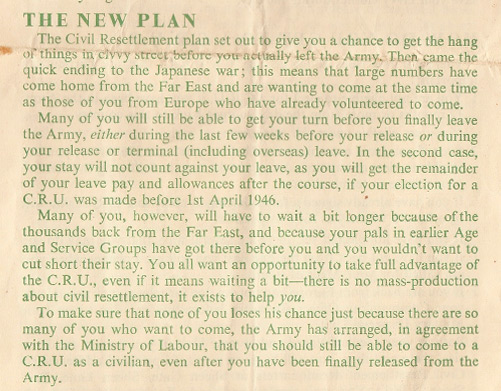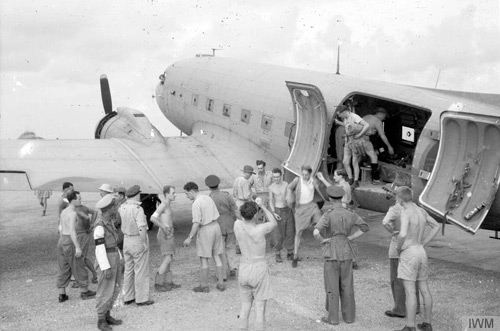

The Long Journey Home
It was just over a month from the announcement that war had ended to when the men at Ubon camp finally started their long journey home.
Roy and his comrades were beginning to feel as though they had been forgotten.
Arrangements were made to move us from Ubon by small boats to a railway terminus and from there onto our homeward journey. We boarded a train for Bangkok where we arrived the following day . . .
On 25th September it was Roy's turn to leave. Crossing the nearby river they boarded a train for Bangkok where they were given a rapturous reception by the local Thai population. They stayed overnight at the aerodrome and on the following day were organised into groups of twenty five ready to wait their turn to be called to the runway. There they boarded the waiting Dakota aircraft which would carry them to their next destination, Rangoon in Burma.
At Rangoon the priority was to give the men the medical attention they had been deprived of for so long. They were given a full medical examination in order to find out who was fit to travel and who would need to recuperate further before continuing with their journey home. Roy recalled very little about this part of the journey except for the accommodation and the fact that they now were fully clothed. No more bamboo slats but a real bed - he said that he and his comrades had their best nights sleep for years.
Many of the men were in an emaciated state having suffered a poor diet and malnutrition for years. Roy was around seven and a half stone at this stage of the journey but he like all the other men could now look forward to rebuilding their shattered bodies with as much food as they needed.
Boarding the Orbita
On 11th October 1945 after a welcome stay in the transit camp at Rangoon, those fit enough to travel embarked upon the final stage of their journey home. Several vessels were used as transports, Roy and his comrades boarded the RMS Orbita, a converted ocean liner, bound for Liverpool, England.

RMS Orbita
It was shortly before the date of Roy's departure from Rangoon that his family received the news they had longed for. They received a letter dated 2nd October 1945 from the War Office.
The letter read :
" I am directed to inform you with pleasure that official information has been received that your son 7633272 Cpl Collins R of the Royal Electrical Mechanical Engineers, previously a prisoner of war in Japanese hands, has been recovered and is now with the Allied Forces.
The repatriation of recovered prisoners of war is being given the highest priority, but it will be appreciated that some time must elapse before they reach the United Kingdom.
Information of a general character regarding these recovered prisoners, including their movements before they reach home, will be given from time to time on the wireless and will be published in the press.

Although the letter was addressed to Roy's father Fred, it was his mother Sarah who received the news. Sadly Fred had died in June 1942 after a short illness but this was something Roy was completely unaware of. He would only learn of this when he returned home. Throughout the time of Roy's imprisonment his mother had sent numerous letters to him (none of which he received whilst in Thailand) and had always signed off from Mother and Father, not wishing to convey any hint about Fred's death, knowing that Roy would be heartbroken at the news.
It was a slow journey back to the United Kingdom as the Orbita was only capable of a maximum speed of approx. 13 knots. The journey was made as pleasant as possible with lots of entertainment and ample food and drink although Roy spoke of some resentment amongst the other ranks that they and the officers were segregated. After three days at sea they made their first brief stop at Colombo in Ceylon (Sri Lanka). From there they journeyed another ten days before they entered the Red Sea heading for the Port of Adabiya and the Suez Canal. Here the troops went ashore for two days and during their stay were issued with winter clothing.
At some stage after being released as PoW's the men were asked to fill in forms known as Liberation Questionnaires The forms recorded information about the camps and the dates men were in them along with the name of the camp commander. Some men gave only the briefest information others provided a lot of detail. Roy's questionnaire named Changi, Nong Pladuk and Ubon as the camps where he stayed. There was also a supplementary question on the form which asked "SABOTAGE - DID YOU DO ANY SABOTAGE OR DESTRUCTION OF ENEMY FACTORY PLANT, WAR MATERIAL, COMMUNICATIONS, ETC. WHILE EMPLOYED IN WORKING PARTIES OR DURING ESCAPE? (GIVE DETAILS, PLACES, AND NAMES). "
Roy's response was:
At Hasimotos Nong Pladuk my friend and I sabotaged 500 barrels petrol by putting Kapok into it. In Hashimotos Workshop where I worked a short time, Nippon rifles were rendered ineffective by cutting firing pins off and pouring acid down barrels. Men forced to work on Tanks threw vital parts away, same tanks were scrapped later. Two small rail cars were rendered useless by Sig. Smith (Reg. No. unknown) and myself. We threw away and destroyed Engine Parts. Diesel Rail Trucks were sabotaged by throwing away of wheel bearings. The Nips could not replace bearings. When workshops moved Lathes, Drills etc. were sabotaged by removal of Bearings, Bushes and necessary components.
The men set sail again on 29th October 1945 when the Orbita made the 24 hour journey through the Suez Canal into the Mediterranean Sea. A week later they stopped briefly at Gibraltar to collect mail before starting the final leg of their journey. Five days later on the morning of 9th November they caught their first sight of England as they made their final approach into Liverpool docks.
November 9th 1945 - Home at Last
The Orbita docked in the early afternoon of 9th November 1945 to a crowded dockside of people cheering and waving flags. Roy didn't know if his parents were in the crowd but this wasn't the time for a long awaited reunion. The men were quickly disembarked where they boarded buses for the short journey to a transit camp (known as 78 Transit Camp) in Maghull. They were anxious to return to their loved ones but had to undergo final medical examinations and other formalities before being released. When Roy was given the all clear from the Medical Officer he sent a telegram to his parents to inform them he would be home the following day.
On the 11th November Roy received his pass and travel documents and boarded a train for Oldham. When he arrived at Oldham Central Station his happiness quickly turned to sorrow as his mother was alone on the platform to greet him. It was only then he learned that his father had died three years earlier.
I was greeted by my mother who told me my father had died. All mail we should have received was given to me after the war.
It was a sad homecoming and one which Roy would never forget as he was so close to his father, Fred.
The following year he attended a Civil Resettlement Unit course for around two months, the purpose of which was to " . . . .help you get the hang of things in civvy street." Around twenty CR units were set up in large houses around the country with each unit taking a small group of men for about six to eight weeks. It was there where they could be helped to adjust to life as a civilian and rebuild their confidence and self esteem.

Extract from the leaflet "The New Plan" given to returning PoW's
With no counselling and being repeatedly told not to discuss anything about their ordeal as prisoners the ex PoW's had to live with the nightmares and carry on as best they could. It was left mainly to their families and friends to help them adjust to civilian life.
Roy was finally demobbed on 28th October 1946 after serving for 6 years and 135 days.
And so his story as a soldier ends. Although he had survived malnutrition, malaria, dysentery, and other tropical diseases, the mental torment and cruelty of being a captive for over three and a half years and being left with chronic health issues, Roy always considered himself as one of the lucky ones. He never recalled many of the terrible atrocities he witnessed – and most of those terrible memories died with him.
Of around 65,000 allied soldiers taken prisoner over 12,000 died while working on the Railway.


